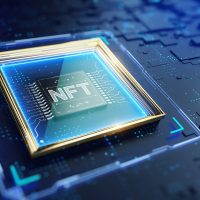Can You License An NFT?

As defined by Forbes Magazine, an NFT (non-fungible token) is a “digital asset that represents a real-world object.” Like cryptocurrency, ownership of an NFT is recorded on a distributed ledger called a blockchain. However, unlike cryptocurrency, NFTs are not “fungible.” Whereas bitcoin is equivalent to any other bitcoin, each NFT has its own unique digital signature and the value of an NFT may vary.
This raises an important question: Can you license an NFT? The answer is ‘yes’—though it is important to understand what exactly is owned and can be licensed. In this blog post, our Florida trademark and copyright licensing attorney explains the key things that you should know about your ability to license an NFT.
What is an NFT Licensing Agreement?
An NFT is a digital asset. Ownership of a NFT is confirmed by the blockchain. That being said, there may also be other property rights associated with an NFT. More specifically, an NFT owner may have a trademark right and/or a copyright. These rights restrict the ability of others to reproduce or otherwise distribute copies of the unique work.
An NFT licensing agreement is a contract that grants the other party the right to use the protected work in a particular context. NFT licensing agreements are a big part of the industry. In fact, many NFTs have licensing agreements encoded into their blockchain through something known as a ‘smart contract.’
The Details and Structure of the Agreement Matter
Similar to any other type of contract, an NFT licensing agreement is highly customizable. It is crucial that any licensing agreement—whether it is encoded into the blockchain as part of the NFT or agreed upon by the parties during or after a sale—is properly drafted. Here are some of the key things that should typically be addressed within an NFT licensing agreement:
- Ownership: The NFT licensing agreement should clarify exactly who owns what. There should not be confusion about core ownership rights.
- Terms of the License: What can the licensee do with the NFT? Further, what, if any, royalties should be paid to the owner of the work? The contract should address the specific terms of the license.
- Restrictions: Are there any restrictions on either the licensor or licensees’ ability to control the NFT while the contract is in place? If so, these restrictions should be very clear.
Licensing agreements are complicated—especially when NFTs are involved. Remember, the ownership of an NFT does not necessarily grant a person IP rights over the work. A copyright may still be with the original artist/author unless there is an explicit (smart contract or traditional contract) statement otherwise.
Speak to Our Florida IP Licensing Attorney Today
At Perkins Law – Brand Protection, our Florida intellectual property law attorneys are available to help clients with licensing issues, including the licensing of NFTs. If you have any questions about the licensing of NFTs, we are here as a legal resource. Call us now or connect with us online to set up your completely confidential consultation. We provide IP licensing representation in Palm Beach County and throughout the wider region of South Florida.
Source:
forbes.com/advisor/investing/cryptocurrency/nft-non-fungible-token/
